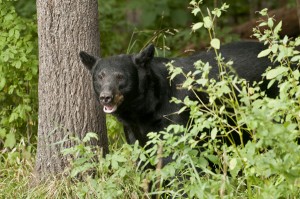March 09, 2012
By Dr. Dave Samuel
 Some of the most outspoken, aggressive opponents of hunting cannot be appeased. You can compromise till the cows come home, and it is a total waste of time and money. It would be nice to ignore such folks, but they use legal avenues to waste the time, talents, and funds of state and federal wildlife agencies. They will always do so.
Some of the most outspoken, aggressive opponents of hunting cannot be appeased. You can compromise till the cows come home, and it is a total waste of time and money. It would be nice to ignore such folks, but they use legal avenues to waste the time, talents, and funds of state and federal wildlife agencies. They will always do so.
Take bear management for example. Over the past 30 years, antihunters have challenged bear hunting from every conceivable angle. They never challenge deer or elk or antelope hunting at the state level. But they've eliminated bait and hound hunting for bears in several states and provinces, and every time a state attempts to initiate new bear seasons, this small minority screams long and loud and uses the court system to tie things in a knot. All this while average citizens suffer bear problems and the bears become habituated to suburban life. It's sad for the bears as well.
The antis' job was easier in states such as New Jersey, where former Governor Corzine was opposed to bear hunting and his wildlife biologist's recommendations. That helped invigorate this small minority at the expense of many citizens who had bear problems. Finally, with Corzine gone, a bear season went through. This past fall, New Jersey hunters harvested 13 percent of the estimated population, taking 469 black bears. The response from antis was predictable. They don't think the documented negative incidents people have with bears are accurate. They don't believe that lowering the black bear population is necessary. Like I said; you cannot appease them. They
will always have a reason to oppose black bear hunting in New Jersey, no matter what happens, no matter the dangers bears present, no matter what the science shows.
Advertisement
Black bears in parts of Nevada are growing at an annual rate of 16 percent. True, the population isn't large, with an estimated 300-400 bears that live for the most part in the Tahoe Basin area. The Wildlife Commission approved an August 2011 hunt that would allow the harvest of 20 bears, of which only six could be females. There was plenty of outcry but the Governor decided to support the hunt. Even so, various delays postponed the hunt until December 2011, and as I wrote this column their first bear season was under way.
Nevada typifies a growing trend where states initiate limited quota hunts as their small bear populations grow. Maryland, South Carolina, Georgia, Kentucky, and Oklahoma initiated bear seasons in the past 10 years, even though bear numbers were less than 1,000. For example, the first bear season in Kentucky began in 2009, and their December 2011 hunt only allowed 10 bears to be harvested. Oklahoma also initiated their first bear season in 2009, and this fall the two-day harvest was 31 bears. The approach these states took established a bear season that will continue as their bear population grows.
Emotional appeal and flawed claims are often given credence in the press and are even fueled by the lack of state government response. This does a disservice to citizens who are getting inaccurate information on nonlethal control methods. Our state wildlife agencies have the data to support the use of managed hunts to minimize human-bear conflicts, and that is why we see more and more states using lethal control. Those are the bear facts.
Advertisement

